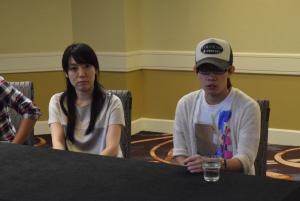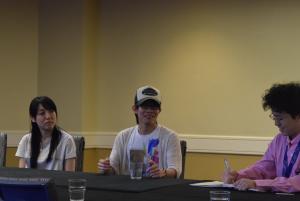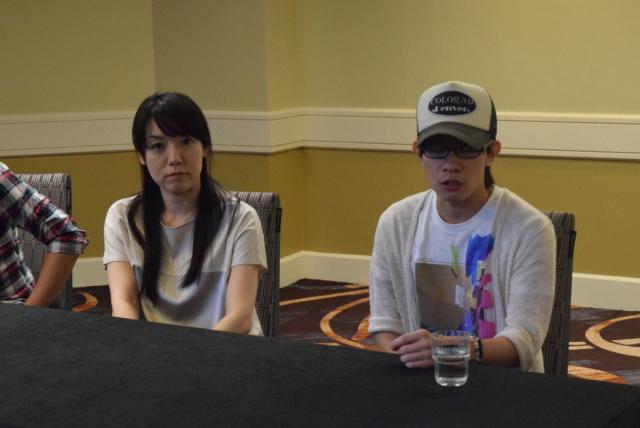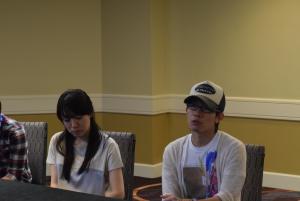Day 2 of Otakon 2015 saw The Outerhaven crew sitting down with Toshiyuki Toyonada and Shuko Yokoyama of Durarara! fame. Toyonada voices Mikado Ryuugamine in the series, and Shuko Yokoyama is the series’ producer. We had a chance to talk shop about Durarara and other topics of interest throughout the interview. We also wanted to thank the Otakon management for making this interview possible in the first place.
This interview has been transcribed at the request of Ms. Yokoyama and Mr. Toyonada’s manager and as such we have honored that request.
Clinton Bowman: The first question goes to you, Mr. Toyonada. What would you say was your most challenging role out of all the characters you have voiced?

Clinton Bowman: Second question goes to Ms. Yokoyama. You’ve produced some wonderful anime and I would like to know which one was the most challenging for you to produce?
Shuko Yokoyama: I cannot really put my hand on which one was the most difficult, because they are all very different. But there are other kinds of difficulties in terms of experience and what I can do now and what I was not able to do, and in terms of that, I would have to say BACCANO! was the most difficult one because that was my first one in producing. I did not have as much experience producing then as I do now.
Clinton Bowman: Mr. Toyonada, two questions: Given the source material for anime is usually manga or light novels with no audio, how difficult is it to find a voice that matches the character, and do you have any character personalities that you like voicing the most?
Toyonada: Firstly, I would have to say that depending on who I voice as, there are some characters that hold things that are common to me, either one way or the other. Then again, there are some other characters that have no certain similarity to me, so I think that is an interesting thing [laughs.] Apologies for the very Japanese sounding answer.
Clinton Bowman: [laughs] That’s fine with me.
Toyonada: Thankfully, a lot of the characters that I have voiced weren’t extremely evil. Thankfully for that, I’ve been able to enjoy the characters that I have voiced so far.
Clinton Bowman: Ms. Yokoyama, when you saw the premise for Samurai Flamenco, what went through your mind at the time?
Toyonada: Oh!
Yokoyama: Upon the planning, the directors, the writers and and I got together about once a week for about 2 years, and upon planning what we would do for Samurai Flamenco, we wanted to do something that was unseen until now, that no one has seen yet. Although that we wanted to make something that hasn’t been seen yet, and brand new, we were all very induced by American hero shows, such as Kick-Ass, [Superman,] The Avengers, X-Men, Hulk and Iron Man. Although we loved stuff like that, we thought that by doing the same thing, we would have been held to the same standards, so we needed to do something different. Throughout those two years, that has come into shape as Samurai Flamenco, but I kind of fear that we have gone a bit overboard. Do you know Natural Born Killers?
Clinton Bowman: I do, but it’s not coming to me right now.
Yokoyama: We really wanted to do something similar to what the main actor of Natural Born Killers did on a hero show that I cannot place the name of, but we really wanted to do something like that.
Clinton Bowman: Mr. Toyonada, can you give us some insight on how the voice acting process works in Durarara? Do you record lines and then the animators match the lines to the footage or vice versa?
Toyonada: Recently in many Japanese anime, not just Durarara!, but in many others, there has been cases where the animation provided is still in the making, and is still in white and black. In that case, we talk with the director and ask him questions such as: “How much is his mouth open,” and whatnot and use our imagination.
Clinton Bowman: Ms. Yokoyama, Sometimes fans get upset over the fact that there are filler episodes in anime, but we understand why it is necessary sometimes. How difficult is it to make filler seem as engaging and appealing as the canon material for a show?
Yokoyama: Regarding the filler episodes, we try to make those not as filler, but as character development episodes. It’s like a spinoff of that certain character, and in the case of anime specifically, there are cases where there are fans of a certain character, so we want to provide more flesh to the character.
Clinton Bowman: Mr. Toyonada, a quick funny question. You performed the opening to Durarara!!x2 Ten and I must say that it is truly amazing and wish to thank you for such a wonderful song. However, I feel that I may ask this, if this is The Day I Laugh, will you give up and tell me it’s all okay?
Toyonada: [laughs] I’m sorry to break it to you, but those lyrics over there, “It’s Not Okay,” those aren’t actually the lyrics.
Clinton Bowman: I figured as much. I figured as much. Darn those English translations, never getting it right! [chuckle]
Toyonada: [laughs] Oh really?
Clinton Bowman: Yeah, some of them are fan translations and they don’t get it right all the time so when it comes to these things it becomes funnier, and when the real translation comes it’s like: “Oh wait…this is not what…wait…what?!” [laugh]

Clinton Bowman: Ms. Yokoyama, one final question. It seems like a lot of anime are getting 12-13 episodes and sometimes people feel a show would benefit if it had more episodes to help with character backgrounds or story points. In your opinion, is it an issue that there’s not enough source material or are companies afraid of committing to longer series these days, or is it something completely different?
Yokoyama: Well, the truth is there are some very long running anime, such as Doraemon, or things that you would know such as Bleach or Gintama. I think more of the reason why series 12-13 episodes long are becoming major right now is because we often want to keep providing new things so we can keep our audience entertained. We don’t really know if it’s good or bad to have a season be twelve or thirteen episodes, but then I think we’re also afraid that our audiences will become bored.
Clinton Bowman: Alright! Thank you very much for having me.
Toyonada & Yokoyama: No, thank you. It was a pleasure.



